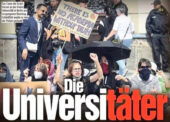On the occasion of the 75th anniversary of the German Basic Law, the Digitalcourage association is calling for a fundamental right not to have to use digital devices. A petition is to convince the Bundestag.
The now widespread digitalisation of services saves time and offers advantages: Appointments with authorities and doctors can be booked online, a rail pass can be shown on a mobile phone and an expected parcel can be located via shipment tracking. But what if digital freedom becomes a must, i.e. there is no doctor’s appointment without an online account, no railcard without an app and no discount ticket without an email address?
The Bielefeld-based association Digitalcourage is currently running a campaign to draw attention to this “digital coercion”, which particularly penalises older and sick people as well as those on low incomes. According to the criticism, existing services that are accessible without a digital device are being dismantled at a rapid pace and replaced by services that are tied to a smartphone, a specific app or an online customer account. This is at the expense of participation and freedom of choice. It is therefore important that a “non-digital way” is always available. In a column in the “Süddeutsche Zeitung” a year ago, the editor Heribert Prantl called for this as a “right to an analogue life”. This text was the impetus for the campaign, Digialcourage said at a press conference on Tuesday last week.
At the press conference, Digitalcourage cited the parcel service provider Deutsche Post DHL Group, which had already received the negative “Big Brother Award” from the organisation a year ago, as a bad example of digital services without freedom of choice. By changing the way its packing stations work, the company is forcing its customers to use a smartphone and a DHL app.
On the occasion of the 75th anniversary of the Basic Law on Thursday, Digitalcourage launched a petition to enshrine the freedom of choice for digital or analogue applications for services as a fundamental right. The aim is to persuade members of the Bundestag to approve such an amendment to the Basic Law. This is conceivable, for example, in Article 3 Paragraph 3, which stipulates that no one may be favoured or disadvantaged because of chosen or unchosen characteristics.
The fact that a considerable number of citizens in Germany are affected by digital coercion is confirmed by the civil rights campaigners with figures from the German Federal Statistical Office from April of this year, according to which five per cent of all inhabitants between the ages of 16 and 74 have never been online – that is around three million people, according to the statistics.
They also criticise the fact that apps for doctor’s appointments, railcards or DHL parcels send data to tracking companies without being asked and that these companies then bother users with targeted advertising. If this “forced data transfer” comes from former state-owned companies, this should be “particularly reprimanded”, says Digitalcourage.
The association, which has been campaigning for fundamental rights, data protection and “a world worth living in in the digital age” since 1987, criticises the fact that the services described are part of an important basic service and that citizens are being excluded from them as a result of mandatory digitalisation. Digitalcourage explicitly describes itself as “tech-savvy”, meaning that its members are not interested in foregoing the benefits of digitalisation.
However, the Bielefeld-based civil rights campaigners demand that citizens should be allowed to decide for themselves whether and when a smartphone should be used or even purchased. The same applies to operating systems on which the required apps have to be installed, but which are often subject to a charge. Social dependence on digital solutions is a risk, says Digitalcourage, whereas freedom of choice promotes “social resilience”.
Published in German in „nd“.
Image: Digitalcourage demands that a “non-digital way” should always be available for services (CC-BY 4.0).





Leave a Reply